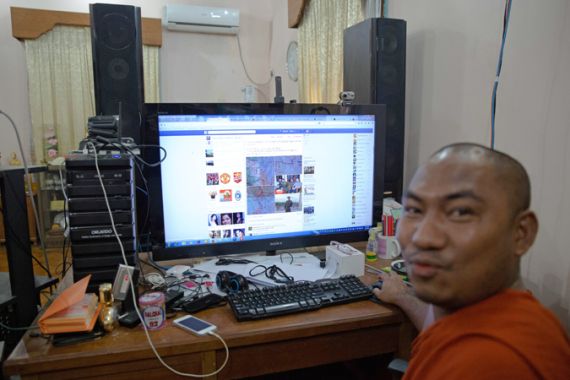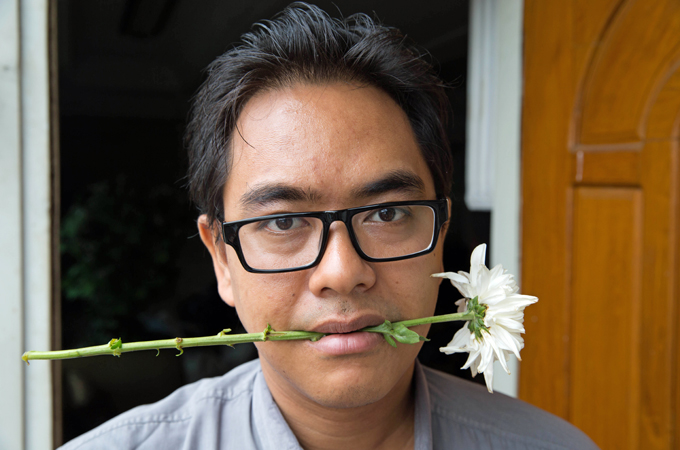Facebook in Myanmar: Amplifying hate speech?
Since violence erupted in 2012, Facebook users in Myanmar have fanned anti-Muslim sentiment.

Yangon, Myanmar – A nest of laptops in a shabby downtown apartment here acts as the modest, but passionate, command centre of Myanmar’s battle against hate speech.
White flowers stand in a glass bottle on a table surrounded by volunteers sitting cross-legged, lit up by their computer screens.
The group of young people work for Panzagar, a new civil society organisation dedicated to countering the tide of online vitriol with flower power or, more accurately, flower speech.
“Now, compared to the military regime, we have some freedom, there is no censorship, and we can use the internet and write whatever we want on the Facebook,” said Panzagar’s Nay Phone Latt. “But at that time there are so many people who misuse the freedom of expression.”
In 2013 he founded Panzagar, which means “flower speech”, in response to the wildfire of anti-Muslim sentiment that has spread across the southeast Asian nation in the past two years, sparking deadly clashes.
Some 250 people were killed in the ensuing violence and more than 140,000 are living in displacement camps. The overwhelming majority of victims hail from the minority Muslim Rohingya population, although some Buddhist monasteries, homes and businesses have also been burned down in revenge attacks.
“Since the violence in Rakhine state began, we can see that online hate speech is spreading and becoming more and more critical and dangerous,” said Wai Wai Nu, a civil society activist. “I think Facebook is the most effective way of spreading hate speech. It‘s already very widespread, infecting the hearts of people.”
Panzagar organises online and distributes posters, pamphlets and stickers in the street, discouraging people from spreading hatred in society by literally putting flowers in their mouths.
“Freedom should have limitations if your freedom harms others,” Latt said, scrolling through some xenophobic Buddhist Facebook accounts, many of which are created under pseudonyms.
‘Muslim dogs’
One comment by Khine Thu Rain Myo read, “We should kill every Muslim. No Muslims should be in Myanmar.”
A response from Zawzaw Min asked: “Why can’t we kick out the Muslim dogs?” – a term often used by extremists to denigrate the Muslim community in Myanmar.
There are ethics to using Facebook. The posts we write on our own should not be those that spread hate speech or personal attacks.
According to Voices that Poison, a US-based human rights group, speech that describes victims as vermin, pests, insects or animals is a rhetorical hallmark of incitement to violence, even genocide, because it dehumanises the victim.
Free speech is very much a novelty in a country emerging from half a century of draconian censorship and international isolation.
In the past three years, as the former military regime has loosened its grip, a sense of Buddhist besiegement and corollary intolerance has been allowed to blossom. Internet hate speech has a limited reach in rural areas where most of the violence has erupted, but that is expected to change dramatically in the next few years as more of the country gains internet access.
Although it’s on the cusp of an information revolution, Myanmar still straddles the analogue and digital worlds. Bank clerks still use the telegraph office in Yangon to send coded messages around the country. The government, meanwhile, has announced multi-billion-dollar telecommunications and oil block licenses via Facebook – but asked for responses to a draft bill on religious conversion by fax.
The Irrawaddy magazine has called the Myanmar government’s spokesperson, Ye Htut, the “Facebook Minister” for his frequent use of the social media site.
Just a few years ago, SIM cards cost thousands of dollars – but Qatar-based Ooredoo and Norway’s Telenor hope to put a cellphone in the hands of 90 percent of the country’s 60 million people within five years, up from the current share of less than 10 percent.
“There are ethics to using Facebook,” Ye Htut wrote on his page this month. “The posts we write on our own should not be those that spread hate speech or personal attacks.”
Buddhist ‘besiegement’
Nearly 90 percent of Myanmar‘s population follows Theravada Buddhism. The monkhood is deeply revered here, and beyond reproach. Many monks believe Myanmar‘s Buddhist identity is under threat and their teachings are widely accepted, creating a mentality of victimhood and besiegement.
 |
| Panzagar activists have tried to discourage hatred by putting flowers in people’s mouths [Hereward Holland/Al Jazeera] |
Ashin Kumara, a senior monk, claims his country is at risk from Islamisation, echoing the attitudes of many other Buddhist nationalist leaders across the country. Despite the absence of evidence, he believes the minority Muslim Rohingya population in the west of the country is attempting to carve out a separate state for themselves, and that Muslim population growth is outstripping that of Buddhists.
“[Rohingya] come out from the mosque chanting slogans of ‘kill the [Buddhist] Rakhine, this land is our land, we must seize Rakhine lands and become part of Bangladesh’,” Ashin Kumara told Al Jazeera at his monastery in Yangon.
Kyaw Min, president of the Democracy and Human Rights Party, a Rohingya political party, firmly rejects these allegations. He blames political elites for underwriting both online and offline religious rancour, and using the ensuing violence to discredit the democratic reform process.
“Rohingya are not demanding that,” Kyaw Min told Al Jazeera by telephone. “This is just an illusion, an excuse to suppress the Rohingya. Islam is not advancing. [This idea] is a creation of a group of vested interests for a political objective.”
Echo chamber of hate
A post on a Facebook page allegedly curated by Ashin Wirathu, a leader of the chauvinist anti-Muslim “969” movement, claims “all terrorists are Muslim … they kill innocent men and women so peace and Islam are not related”. The post was shared 136 times.
There are both social and technical reasons why Facebook has gained immense traction in Myanmar. The website requires low bandwidth to load, is easy to use for non-English speakers and handles Myanmar fonts well compared to other social media like Twitter.
For a nation emerging from decades of paranoid authoritarianism, Facebook is a particularly popular medium for sharing news, information and ideas, said Matthew Schissler from Paung Ku, a civil society organisation.
The way people use Facebook aligns closely with practises long established for surviving during the authoritarian era, Schissler explained. “Rumour and word-of-mouth information are more credible than the news and government announcements in a place where censorship and propaganda have long been the norm. Social media adds a megaphone to this,” Schissler told Al Jazeera in an emailed response to questions.
He worries, however, that Facebook could become an echo chamber where people self-select information sources to rationalise and reinforce the kind of ideology that helps spark mass violence.
“It is very difficult to pinpoint exact evidence that Facebook is fuelling hate speech, but the web has certainly made it easier for misinformation and harmful narratives to spread across boundaries at a faster rate,” said Aela Callan, a journalism fellow at Stanford University who has worked for Al Jazeera.
Furthermore, Facebook – which boasts 1.2 billion users worldwide – does not proactively moderate content, leaving that job to its users.
Instead, Facebook focuses on two things: giving people tools to reach out to the person who posted the content and responding to reports of content that violate their standards, said Facebook spokesman Matt Steinfeld.
People can now report abuse in Myanmar language, he said. “We‘re always looking for ways to help people address content on Facebook that concerns them,” Steinfeld wrote in an email to Al Jazeera.
All sides agree that allowing the government to regulate social media would be a step backwards, capitulating to the idea that Myanmar isn’t ready to embrace the freedom and responsibility of democracy.
Few people understand the dangers of government regulation more than Nay Phone Latt. Under the junta he spent four years in jail for his online activism, under laws that still exist.
“If we don’t regulate ourselves … they will take the power back,” he said.